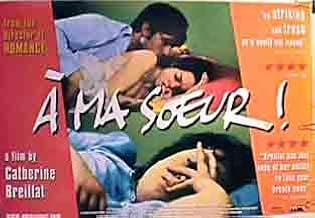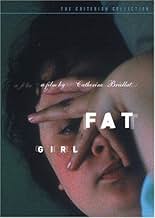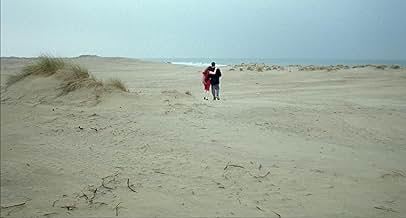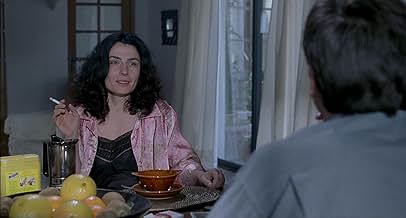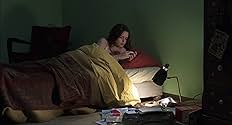ÉVALUATION IMDb
6,4/10
14 k
MA NOTE
Deux soeurs confrontent leurs attitudes et expériences sexuelles lors des vacances en famille.Deux soeurs confrontent leurs attitudes et expériences sexuelles lors des vacances en famille.Deux soeurs confrontent leurs attitudes et expériences sexuelles lors des vacances en famille.
- Prix
- 4 victoires et 3 nominations au total
Claude Sésé
- Police Officer
- (as Claude Sese)
Avis en vedette
Directed by the 'controversial' Catherine Breillat (she showed a hard-on in her last movie, 'Romance'), the story revolves around a family on holiday with two adolescent sisters, the chubby 13 year old Anaïs (played by Anaïs Reboux) and the rather more svelte Elena (Roxane Mesquida) who is two years her senior, although rather less mature. Both girls are still virgins, although Elena is clearly aware of the power of her beauty over the opposite sex. Effortlessly she pulls Italian law student Fernando (Libero De Rienzo, with whom she begins an intense relationship. Fernando talks of love, but is obviously keen for sex. Poor Anaïs is unfortunately sharing a room with the pair as they fumble towards a deflowering. Indeed, this is one of the most beguiling scenes in the movie; you feel awkward bearing witness to what is going on - the constant demands of Fernando for 'a demonstration of love', which after refusals brings forth the sorts of coercing phrases regarding anal sex that so many girls must dread to hear.
The animosity is often intense between the sisters, Anaïs' bitterness towards her sister combined with a resigned maturity that only rejection and frustration can breed. But at the same time there are wonderful scenes of the two sharing sisterly moments; albeit with bile never far away. The point is well made, the bond is there, no matter how much of a bitch Elena can be. Anaïs is such a lost, sad character; the melancholic beauty of one scene on the beach where she is singing to herself whilst Elena and Fernando 'make out' is incredible. Also well portrayed is the relationship with the parents. Mother is very much like Elena; Father is a workaholic who hates holidays and returns home before the others. Although the parents are mostly secondary in the story, you sense that they tend to reinforce Anaïs insecurities and knock her down further. This is exemplified in the scene the morning after the first Elena & Fernando night together. Anaïs is clearly really low, crying and choked. Her parents offer zero warmth, the only solace coming from a still caustic Elena shoving bread into her mouth to comfort her.
The story climaxes as the sisters and their mother return home from their holiday, after a gloriously comic scene where Fernando's mother (Laura Betti) visits to reclaim a precious ring that he had given to Elena as an engagement ring. The journey toward home is fantastically shot; the claustrophobia of motorway driving - especially since the mother doesn't like driving, and is pretty p****d at Elena's antics and Anaïs' miserableness - metaphoring the unease between the three, even more so as night wears on and mother becomes more wary of the huge dangerous lorries that she overtakes incautiously on the freeway. If I was an absolute ponce (or totally fearless), I would say these trucks are a metaphor for the male predatory sexuality against the tiny feminine car (which still manages to nimbly overtake at will most of the time). But I'm not (?), so I won't. Anyway, the ending comes as a huge shock. So I'm not going to tell you it. But safe to say you don't leave the cinema with a laugh and a giggle.
Overall, I was actually surprised by how deep this story was; there was only one gratuitous erection, and even that was covered by a condom. A brave attempt to analyse adolescent female sexuality, often leaving an unplesant taste in the mouth, but well worth a go if you're in the mood.
The animosity is often intense between the sisters, Anaïs' bitterness towards her sister combined with a resigned maturity that only rejection and frustration can breed. But at the same time there are wonderful scenes of the two sharing sisterly moments; albeit with bile never far away. The point is well made, the bond is there, no matter how much of a bitch Elena can be. Anaïs is such a lost, sad character; the melancholic beauty of one scene on the beach where she is singing to herself whilst Elena and Fernando 'make out' is incredible. Also well portrayed is the relationship with the parents. Mother is very much like Elena; Father is a workaholic who hates holidays and returns home before the others. Although the parents are mostly secondary in the story, you sense that they tend to reinforce Anaïs insecurities and knock her down further. This is exemplified in the scene the morning after the first Elena & Fernando night together. Anaïs is clearly really low, crying and choked. Her parents offer zero warmth, the only solace coming from a still caustic Elena shoving bread into her mouth to comfort her.
The story climaxes as the sisters and their mother return home from their holiday, after a gloriously comic scene where Fernando's mother (Laura Betti) visits to reclaim a precious ring that he had given to Elena as an engagement ring. The journey toward home is fantastically shot; the claustrophobia of motorway driving - especially since the mother doesn't like driving, and is pretty p****d at Elena's antics and Anaïs' miserableness - metaphoring the unease between the three, even more so as night wears on and mother becomes more wary of the huge dangerous lorries that she overtakes incautiously on the freeway. If I was an absolute ponce (or totally fearless), I would say these trucks are a metaphor for the male predatory sexuality against the tiny feminine car (which still manages to nimbly overtake at will most of the time). But I'm not (?), so I won't. Anyway, the ending comes as a huge shock. So I'm not going to tell you it. But safe to say you don't leave the cinema with a laugh and a giggle.
Overall, I was actually surprised by how deep this story was; there was only one gratuitous erection, and even that was covered by a condom. A brave attempt to analyse adolescent female sexuality, often leaving an unplesant taste in the mouth, but well worth a go if you're in the mood.
Director Breillat is back and, as she did with "Romance", pushing the bounds of censorship in an intellectually challenging fashion. The story follows the sexual development of two sisters in their early teens. Their middle class family embody the usual social mores and protective attitudes. Moreover, the story makes us aware of the legal dilemma of under age sex, undertaken as a matter of conscious choice and with proper protection by the 15-year old (older) sister with a boyfriend only a few years her senior (ie the relationship would be legal in Netherlands but not in many countries, including France). These are two fairly "normal" sisters, although the younger one is excessively overweight and only fantasizes about getting a boyfriend. There is some possible interpretation that the 15-year old's psychological development would progress more soundly were she not (initially) fettered by taboos over her own virginity. In one scene, a TV in the background has a Breillat-type character being interviewed and giving her philosophy about the intrinsic nature of sex, how it is something common to us all and that can be understood by anyone, and that we are all alike inasmuch as no-one is perfect. The characters and scenes are painted brilliantly, the sibling rivalry coupled with intense sisterly bonding, the mother driving at night and, as many people will have, with a lack of sleep and so not as perfectly safely as normal. It is the realism and ordinariness of the situations that keep us on the edge of our seats. The dialogue has the realism that suggests youngsters may have suggested some of the lines, with their observations that have the power to startle us out of complacency. The use of actors so young in fairly explicit scenes will be a matter of great concern, but Breillat is serious about her work and convinces us that she is not pandering to sensationalism but raising valid questions about how we effectively handle the challenges presented by precocious adolescents. The film is more polished than Breillat's earlier work and has an unnerving denouement, well-delivered.
Brelliat drives me a little crazy. She is an observer of one small corner of life and seems incidentally a filmmaker. You get different editions of her observations on the distance of young sex across which we throw ropes.
So the question is which is the best and whether each one that follows adds something new, worthwhile.
The best to my mind was "A Real Young Girl" of thirty years ago. It had an honesty that everything subsequently lacks. By this I mean you could feel the filmmaker's emotions quite apart from whatever was happening on screen.
What we have here are two scenes. The first is hugely promising: a pretty girl loses her virginity while witnessed by her much younger sister. Drawn out circling of the boy. Set up in a way that we share in the discomfort as witness and some of the charm of the situation. We are seducer, voyeur, victim.
Brelliat knew this well enough to build a whole different movie about the nature of this voyeurism, "Sex is Comedy." You need to see the two together to get the folding.
The problem with Brelliat is that she has these emotional insights and she can pose scenes. But she has no skill at all in seeing the larger shape of the narrative. She doesn't understand the long form and the structure of a story. Lacking this, we get only scenes, and here we have only two. The second one is brutal, as if the first demanded the second.
The only thing to recommend this is the effect you get from watching the first scene. You quickly realize that because you are watching, you are part of the damage she sketches.
Ted's Evaluation -- 2 of 3: Has some interesting elements.
So the question is which is the best and whether each one that follows adds something new, worthwhile.
The best to my mind was "A Real Young Girl" of thirty years ago. It had an honesty that everything subsequently lacks. By this I mean you could feel the filmmaker's emotions quite apart from whatever was happening on screen.
What we have here are two scenes. The first is hugely promising: a pretty girl loses her virginity while witnessed by her much younger sister. Drawn out circling of the boy. Set up in a way that we share in the discomfort as witness and some of the charm of the situation. We are seducer, voyeur, victim.
Brelliat knew this well enough to build a whole different movie about the nature of this voyeurism, "Sex is Comedy." You need to see the two together to get the folding.
The problem with Brelliat is that she has these emotional insights and she can pose scenes. But she has no skill at all in seeing the larger shape of the narrative. She doesn't understand the long form and the structure of a story. Lacking this, we get only scenes, and here we have only two. The second one is brutal, as if the first demanded the second.
The only thing to recommend this is the effect you get from watching the first scene. You quickly realize that because you are watching, you are part of the damage she sketches.
Ted's Evaluation -- 2 of 3: Has some interesting elements.
Moviezone Award Jury rapport 2002 - Fat Girl (Catherine Breillat)
The winning film amongst three fantastic films has got to be a very special feature. Catherine Breillat showed the jury the world of two sisters which do not only differ in the physical aspect of their characters but also have their own very distinctive expectations and desires when it comes to their first time having sex. The bond between the sisters is portrayed very well, the girls and the life they live are very recognizable. When you are watching the film you forget you are watching actresses when they flawlessly get across very strong and personal emotions in a very subtle manner. The observations of the fat girl show precisely how she encounters her sisterhood; her negative self-image and the absurd fascination for her sister. The strong hand of the director and the personal theme makes Fat Girl a film which will be remembered for a long time and which will be the subject of many discussions.
The winning film amongst three fantastic films has got to be a very special feature. Catherine Breillat showed the jury the world of two sisters which do not only differ in the physical aspect of their characters but also have their own very distinctive expectations and desires when it comes to their first time having sex. The bond between the sisters is portrayed very well, the girls and the life they live are very recognizable. When you are watching the film you forget you are watching actresses when they flawlessly get across very strong and personal emotions in a very subtle manner. The observations of the fat girl show precisely how she encounters her sisterhood; her negative self-image and the absurd fascination for her sister. The strong hand of the director and the personal theme makes Fat Girl a film which will be remembered for a long time and which will be the subject of many discussions.
At the NY Film Festival's Q&A with Breillat, she expressly forbid seeing "Fat Girl" (as she prefers to call it) as a morality play. She eluded any attempts to draw her into conclusions about her film, insisting that she is not a moralist.
What is clear from the questions she asks, however, is that she views sex with a certain contempt, especially as regards the male role in the act. The men that are in the film are either insensitive, duplicitous or murderous. Breillat's intent is to show how adrift any adolescent girl is when it comes to sexuality and to somehow convey that to an adult audience. She counseled young Anais during filming by saying, "We are making a film that I don't even think you can see when it is done, but it is not for you. It is supposed to scare adults."
What is clear from the questions she asks, however, is that she views sex with a certain contempt, especially as regards the male role in the act. The men that are in the film are either insensitive, duplicitous or murderous. Breillat's intent is to show how adrift any adolescent girl is when it comes to sexuality and to somehow convey that to an adult audience. She counseled young Anais during filming by saying, "We are making a film that I don't even think you can see when it is done, but it is not for you. It is supposed to scare adults."
Le saviez-vous
- AnecdotesA man was arrested by Canada Customs and Revenue Agency in July of 2003 for importing a copy into Canada, on the grounds that the movie constituted obscene material.
- GaffesToutes les informations contiennent des divulgâcheurs
- Citations
Anaïs Pingot: When I hate you, I look at you and then I can't.
- Autres versionsWhen released on home video in the UK, this title was cut by 1 minute and 28 seconds to cut down a scene of sexual assault. Ireland banned it altogether.
- Bandes originalesSocial Climber
Performed by Laura Betti
Meilleurs choix
Connectez-vous pour évaluer et surveiller les recommandations personnalisées
- How long is Fat Girl?Propulsé par Alexa
Détails
Box-office
- Brut – États-Unis et Canada
- 725 854 $ US
- Fin de semaine d'ouverture – États-Unis et Canada
- 31 237 $ US
- 14 oct. 2001
- Brut – à l'échelle mondiale
- 765 705 $ US
- Durée1 heure 35 minutes
- Couleur
- Mixage
- Rapport de forme
- 1.85 : 1
Contribuer à cette page
Suggérer une modification ou ajouter du contenu manquant


![Bande-annonce [OV]](https://m.media-amazon.com/images/M/MV5BNTU0ZWE0ODAtMGUwMS00NWRhLTg1NjUtMTFlNTYxOWFiMzhlXkEyXkFqcGdeQXRyYW5zY29kZS13b3JrZmxvdw@@._V1_QL75_UX500_CR0)



